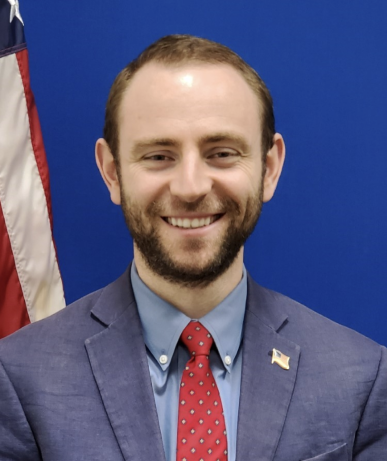
When Mark Hoover was in his second year of graduate school and his financial situation changed, the Robertson Foundation for Government stepped in and enabled him to complete his degree and enter into a career of public service.
“Awarded to me in my second year of graduate school after I had lost an important income source, the fellowship provided me the financial resources to move forward in my degree and the confidence I wasn’t crazy to pursue some career,” said Hoover. “After graduating, I’ve enjoyed professional talks, career development activities, and purely fun social events with other fellows. In a city where connections are so important, the Robertson Foundation offers another valuable network.”
Robertson’s mission was a natural fit for Hoover, who says his parents and his upbringing growing up in the Democratic Republic of the Congo inspired his work in public service.
“First, my parents instilled in each of us the value of working towards a greater good, whether in the public, private, or non-profit sector,” Hoover said. “Second, growing up in the Democratic Republic of the Congo in the 1990s I saw firsthand the meaningless devastation caused by war and the deleterious effects of kleptocracy and poor governance. It’s hard to appreciate the government until you experience its effective absence and I’m grateful to serve the American people.”
He has used his personal experience to guide his career in public service at agencies such as the Government Accountability Office, the Treasury Department, and now as a Foreign Affairs Officer at the Department of State.
“I am grateful to wake up and work on behalf of the millions of Americans who trust the federal workforce to work on their behalf on the issues and in the countries where I’ve served,” Hoover explained. “It is humbling and empowering to know I am responsible to represent them and use their resources as carefully as possible. I’m lucky enough to also work on issues I believe help reduce civilian deaths from armed conflict, which is something I believe is in the interest of every soul on earth.”
And Hoover is being recognized for his dedication to public service. He was selected as one of the Aspen Strategy Group’s second class of 32 Rising Leaders of 2022, who are chosen based on Aspen’s belief that they will “ultimately drive change through dialogue, leadership, and action to help solve the greatest challenges of our time.” Hoover is excited to learn from the other participants and speakers and to discover better ways to build diverse and inclusive teams, lead and be part of organizations of change, and build networks in and out of government.
In his time working in the government, Hoover has seen that there are many motivations for entering public service, which can at times create a challenging environment.
“I think the most enlightening, and challenging phenomenon I’ve experienced in my career has been realizing that some people do not necessarily enter public service because they believe in the United States’ potential to do good and better than we have done. That may seem naïve but it’s true,” Hoover said. “However, I’ve grown to learn and appreciate this fact and learn how to work with, and learn from, people whose career incentives are different from my own.”
But, it is well worth it Hoover says. For those who are interested in a pursuing a career in public service, Hoover says there are a lot of questions you can ask to help guide you through the journey.
“If the person is new to this interest, I think asking lots of ‘why’ questions can help you distill the values you bring to public service – i.e. why the specific topic; why the specific region; why does this matter to the American people,” Hoover explained. “If the person is in the course of study or looking to shift careers, I really believe in talking with current professionals and using the LinkedIn and work histories of current professionals to consider different paths towards their goals. And, these are the same things I do still.”
For those still in school and thinking about a career in public service, Hoover has a few practical suggestions on how to better prepare yourself for the challenges ahead.
“The most practical training I took in graduate school was a course to become a mediator for small claims court. The training instilled in me the practice of listening carefully to what and how people say things and to encourage direct language when people are negotiating or seeking compromise. Less practically, but equally important to me, I greatly enjoyed a course on the history of the Islamic world. The course exposed me to global scholars and helped me understand better important parts of the world,” Hoover said.
As for what Hoover suggests for current RFG fellows and early career professionals as they pursue a career in public service, it’s about believing you can do good.
“I think that in order to most enjoy public service and to provide taxpayers the best service possible, it is best to truly believe that it is possible to do good. Public service is a livelihood but for it to be as valuable to citizens as it is to yourself, I think it’s best done with the belief you can help change things for the better. That doesn’t have to be naïve optimism, but if you don’t believe what you’re doing can make a difference, I think it’s our responsibility to consider passing the baton to someone who does believe that.”